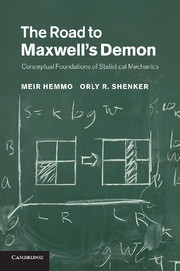Description
The Road to Maxwell's Demon
Conceptual Foundations of Statistical Mechanics
Authors: Hemmo Meir, Shenker Orly R.
A philosophical perspective to statistical mechanics for graduate students and researchers in the foundations and philosophy of physics.
Language: English
Subject for The Road to Maxwell's Demon:
58.62 €
In Print (Delivery period: 14 days).
Add to cart
The Road to Maxwell's Demon
Publication date: 07-2014
Support: Print on demand
Publication date: 07-2014
Support: Print on demand
The Road to Maxwell's Demon
Publication date: 09-2012
337 p. · 15.5x23.5 cm · Hardback
Publication date: 09-2012
337 p. · 15.5x23.5 cm · Hardback
Description
/li>Contents
/li>Biography
/li>
Time asymmetric phenomena are successfully predicted by statistical mechanics. Yet the foundations of this theory are surprisingly shaky. Its explanation for the ease of mixing milk with coffee is incomplete, and even implies that un-mixing them should be just as easy. In this book the authors develop a new conceptual foundation for statistical mechanics that addresses this difficulty. Explaining the notions of macrostates, probability, measurement, memory, and the arrow of time in statistical mechanics, they reach the startling conclusion that Maxwell's Demon, the famous perpetuum mobile, is consistent with the fundamental physical laws. Mathematical treatments are avoided where possible, and instead the authors use novel diagrams to illustrate the text. This is a fascinating book for graduate students and researchers interested in the foundations and philosophy of physics.
Preface; 1. Introduction; 2. Thermodynamics; 3. Classical mechanics; 4. Time; 5. Macrostates; 6. Probability; 7. Entropy; 8. Typicality; 9. Measurement; 10. The past; 11. Gibbs; 12. Erasure; 13. Maxwell's Demon; Appendixes; References; Index.
Meir Hemmo is an Associate Professor in the Department of Philosophy, University of Haifa. He has written on various issues in the foundations of quantum mechanics and statistical mechanics.
Orly Shenker is a Senior Lecturer for the Program in History and Philosophy of Science at the Hebrew University of Jerusalem. She has written on the foundations of classical and quantum statistical mechanics and on the rationality of science.
Orly Shenker is a Senior Lecturer for the Program in History and Philosophy of Science at the Hebrew University of Jerusalem. She has written on the foundations of classical and quantum statistical mechanics and on the rationality of science.
© 2024 LAVOISIER S.A.S.

